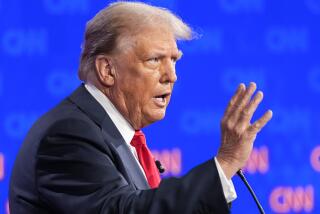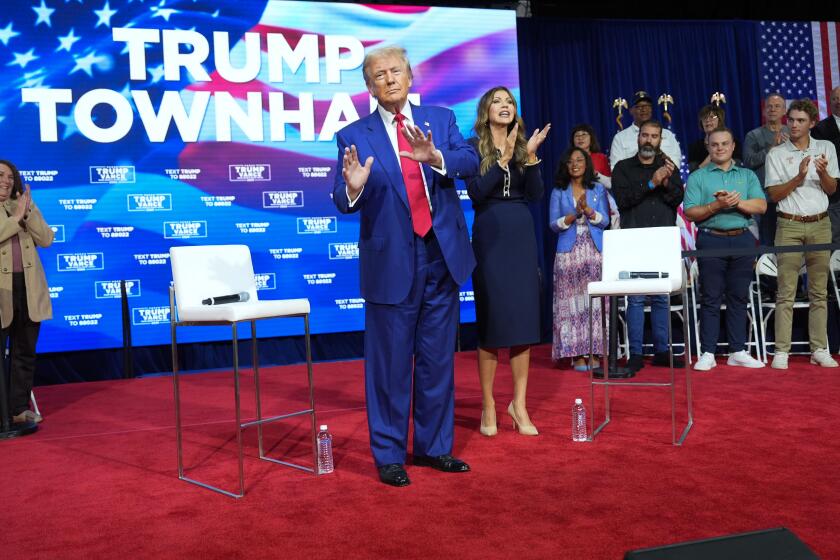‘Slimeball’ versus ‘mob boss’: War of words escalates between president and former FBI director
The verbal war between former FBI Director James B. Comey and the president who fired him took a dramatic escalation Sunday, as Comey denounced President Trump as “morally unfit” and a “stain” on those around him and Trump suggested the former FBI chief should be imprisoned.
In an extraordinary interview with ABC, Comey called Trump a habitual liar, likened the president to a mob boss and said he thinks it is possible that the president is in fact compromised by Russian intelligence.
Asked in the interview whether he thought Russia “has something” on Trump, Comey said: “I think it’s possible. I don’t know.
“These are more words I never thought I’d utter about a president of the United States, but it’s possible,” he told the interviewer, ABC anchor George Stephanopoulos.
“It is stunning” that the possibility can’t be ruled out, “and I wish I wasn’t saying it, but it’s just — it’s the truth,” he said.
The interview is the first Comey has given since his firing by Trump last May, and it comes during a publicity blitz for his book, “A Higher Loyalty: Truth, Lies and Leadership,” which is scheduled for release Tuesday and is already a bestseller.
Though the interview added few new facts to what Comey said in congressional testimony last year, it was striking for the detail of his recollections and his rough language about the president. The network released a transcript of the entire five-hour interview.
Asked about Trump’s mental condition, Comey said: “I don’t think he’s medically unfit to be president. I think he’s morally unfit to be president.”
He likened Trump to a “forest fire” that threatens the norms of American democracy.
“A person who sees moral equivalence in Charlottesville, who talks about and treats women like they’re pieces of meat, who lies constantly about matters big and small and insists the American people believe it — that person’s not fit to be president of the United States, on moral grounds,” Comey said.
“The challenge of this president is that he will stain everyone around him.”
The interview is certain to escalate the president’s anger, which already had reached a high pitch Sunday, with a vicious series of tweets attacking the former FBI chief as “slippery” and a “slimeball.” Trump claimed that he “hardly even knew this guy.”
“Slippery James Comey, a man who always ends up badly and out of whack (he is not smart!), will go down as the WORST FBI Director in history, by far!” the president tweeted.
He appeared to call for Comey’s imprisonment, declaring that Comey’s book did not explain why he “gave up Classified Information (jail), why did he lie to Congress (jail).”
Trump offered no evidence that Comey has committed either of those offenses.
In the interview, as in the book, Comey described Trump as obsessed with his own reputation — including allegations involving Moscow prostitutes — and unconcerned with countering attacks from Russia.
He also repeated his book’s description of Trump as “untethered” to truthfulness and its statement that Trump’s White House style reminded him of the mob.
“The loyalty oaths, the boss as the dominant center of everything — it’s all about how do you serve the boss, what’s in the boss’ interests. It’s the family, the family, the family, the family.”
When he first briefed Trump about the Russia investigation, Comey said, no one brought up how to stop the threat — only how to manage the public relations response.
“No one, to my recollection, asked, ‘So what — what’s coming next from the Russians?’ ” he said.
“You’re about to lead a country that has an adversary attacking it, and I don’t remember any questions about, ‘So what are they going to do next, how might we stop it? What’s the future look like? Because we’ll be custodians of the security of this country.’
“There was none of that. It was all, ‘What can we say about what they did and how it affects the election that we just had?’ ”
Comey said Trump asked him to investigate and disprove allegations contained in the so-called Steele dossier — a collection of allegations compiled in 2016 by Christopher Steele, a former British intelligence agent working for Trump’s political opponents.
The dossier’s central allegation was that Russia was trying to interfere with the U.S. election and assist Trump. The FBI had been reviewing it because it corroborated “totally separate information” that federal agents already had gathered, Comey said.
“It was coming from a credible source, someone with a track record, someone who was a credible and respected member of an allied intelligence service during his career. And so it was important that we try to understand it, and see what could we verify,” he said.
Trump, however, was focused on one particular part of the dossier — the allegation that he had been compromised by Russian intelligence by consorting with prostitutes in a Moscow hotel in 2013.
Trump said “something that distracted me because he said, you know, ‘If there’s even a 1% chance my wife thinks that’s true, that’s terrible,’ ” Comey recalled.
“And I remember thinking, ‘How could your wife think there’s a 1% chance you were with prostitutes peeing on each other in Moscow?’ I’m a flawed human being, but there is literally zero chance that my wife would think that was true. So, what kind of marriage to what kind of man does your wife think [that] there’s only a 99% chance you didn’t do that?”
Comey’s eventual firing helped trigger the appointment of special counsel Robert S. Mueller III, who is now, among other things, investigating Trump for possible obstruction of justice.
That part of the investigation largely centers on Trump’s request to Comey that he go easy on Michael Flynn, Trump’s former national security advisor.
Comey, recounting the incident, said he thought the conversation “possibly” could be obstruction.
“I mean, it’s certainly some evidence of obstruction of justice. It would depend — and I’m just a witness in this case, not the investigator or prosecutor — it would depend upon other things that reflected on his intent.”
While Trump has engaged furiously with Comey — and has been aided by the Republican National Committee, which created a “Lyin’ Comey” website — some other Republicans have tried to stay clear of the debate. On Sunday, House Speaker Paul D. Ryan (R-Wis.) declined to defend Comey.
“I don’t know him very well,” Ryan said of Comey on NBC News. “I’m not trying to be evasive. But what I don’t want to do is — is join some food fight, some book-selling food fight. I don’t see any value in that.”
Ryan said again that he does not see the need for Congress to pass a law protecting Mueller in case Trump moves to fire him.
“It’s not in the president’s interest to do that,” Ryan said. “We have a rule-of-law system.”
Democrats have also been angered by some of Comey’s conduct.
Eleven days before the election, Comey departed from long-standing Justice Department protocol and sent a letter to Congress saying that the FBI had reopened an investigation into Hillary Clinton’s use of a private server to handle her emails. Clinton and her allies have said Comey’s actions helped cost her the election.
During the interview, Comey acknowledged that at the time, he was convinced Clinton would win, and that belief probably influenced his decision to write the letters.
“I don’t remember consciously thinking about that, but it must have been because I was operating in a world where Hillary Clinton was going to beat Donald Trump, and so I’m sure that it was a factor,” Comey said.
“I don’t remember spelling it out, but it had to have been that she’s going to be elected president, and if I hide this from the American people, she’ll be illegitimate the moment she’s elected, the moment this comes out,” he added.
Comey has come under rough criticism for his handling of the Clinton email case from both Democrats and Republicans, who say his decision to write the letters — and to go around his boss, then-Atty. Gen. Loretta Lynch — provided evidence of a fatal arrogance.
Comey said that he hoped he had made the right decision but that he could be wrong.
“And so I think that’s my primary worry about myself, is an overconfidence that can lead to that — that pride, that closed-mindedness,” he said.
Twitter: @jtanfani
UPDATES:
9:45 p.m.: This article was updated with additional quotes.
8:15 p.m.: This article was updated with quotes from the ABC interview.
This article was originally published at 11:15 a.m.
More to Read
Get the L.A. Times Politics newsletter
Deeply reported insights into legislation, politics and policy from Sacramento, Washington and beyond. In your inbox three times per week.
You may occasionally receive promotional content from the Los Angeles Times.











